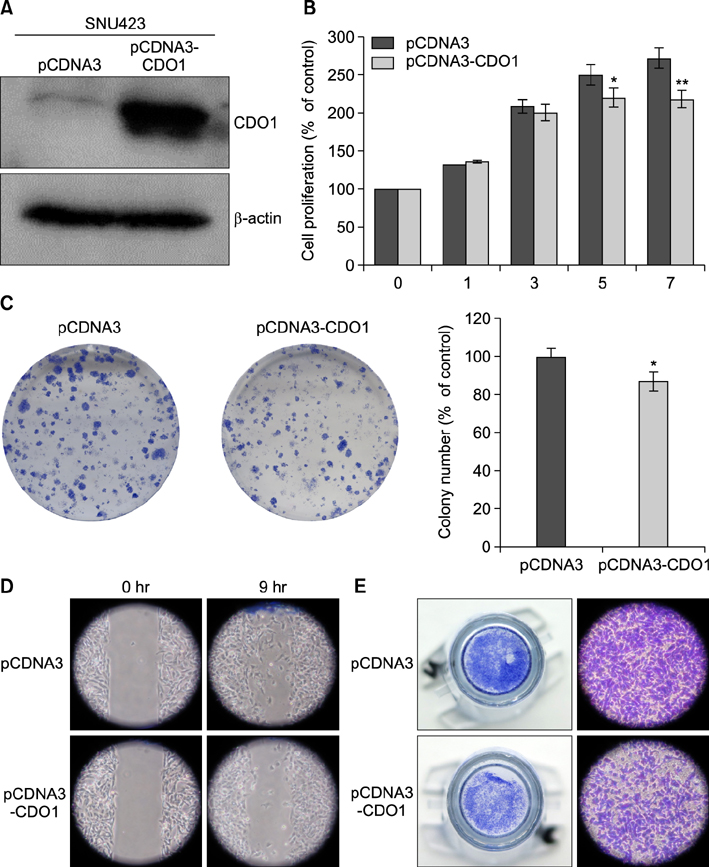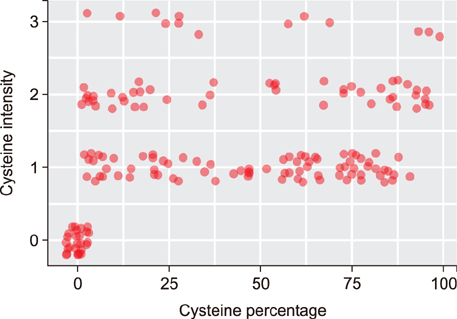Ann Hepatobiliary Pancreat Surg.
2017 Nov;21(4):181-187. 10.14701/ahbps.2017.21.4.181.
Promoter methylation of cysteine dioxygenase type 1: gene silencing and tumorigenesis in hepatocellular carcinoma
- Affiliations
-
- 1Department of Surgery, Korea Cancer Center Hospital, Seoul, Korea. gsceh@kcch.re.kr
- 2Department of Surgery, Dongnam Institution of Radiological & Medical Sciences, Busan, Korea.
- 3Department of Translational Research, Korea Cancer Center Hospital, Korea Institute of Radiological and Medical Sciences, Seoul, Korea.
- 4Department of Pathology, Seoul National University Hospital, Seoul, Korea.
- 5Department of Pathology, Korea Cancer Center Hospital, Seoul, Korea.
- 6Division of Radiation Cancer Research, Korea Institute of Radiological and Medication Sciences, Seoul, Korea.
- KMID: 2397796
- DOI: http://doi.org/10.14701/ahbps.2017.21.4.181
Abstract
- BACKGROUNDS/AIMS
Cysteine dioxygenase type 1 (CDO1) acts as a tumor suppressor and is silenced by promoter methylation in various malignancies. The relationship between the CDO1 methylation status and hepatocellular carcinoma (HCC) tumorigenesis was evaluated.
METHODS
Using a HCC cell line (SNU423), an in vitro demethylation study was performed to confirm whether promoter methylation causes CDO1 down-regulation. The SNU423 cells transfected with the CDO1 cell function was compared to that of naïve cells. An in vivo study using immunohistochemical staining of HCC specimens that were collected from patients who underwent curative liver resection was also performed.
RESULTS
CDO1 was activated after demethylation treatment in the HCC specimens. Moreover, tumor cell proliferation, colony-forming, migration, and invasion activities significantly decreased after CDO1 transfection (p < 0.05). The percentage of tumors that were larger than 5 cm was higher in patients who had a lower expression of CDO1 (p=0.030). Vascular invasion and histological grade were independent prognostic factors for poor overall and recurrence-free survival. The degree of CDO1 expression was not an independent prognostic factor in this study's population.
CONCLUSIONS
These results suggested that methylation down-regulated CDO1 expression in the HCC cells. CDO1 methylation may be a potentially valuable diagnostic biomarker for HCC.
Keyword
MeSH Terms
Figure
Reference
-
1. Belghiti J, Regimbeau JM, Durand F, Kianmanesh AR, Dondero F, Terris B, et al. Resection of hepatocellular carcinoma: a European experience on 328 cases. Hepatogastroenterology. 2002; 49:41–46.2. Wolffe AP, Matzke MA. Epigenetics: regulation through repression. Science. 1999; 286:481–486.3. Jones PA, Baylin SB. The fundamental role of epigenetic events in cancer. Nat Rev Genet. 2002; 3:415–428.4. Baylin SB, Herman JG. DNA hypermethylation in tumorigenesis: epigenetics joins genetics. Trends Genet. 2000; 16:168–174.5. Paz MF, Fraga MF, Avila S, Guo M, Pollan M, Herman JG, et al. A systematic profile of DNA methylation in human cancer cell lines. Cancer Res. 2003; 63:1114–1121.6. Tsuboyama-Kasaoka N, Hosokawa Y, Kodama H, Matsumoto A, Oka J, Totani M. Human cysteine dioxygenase gene: structural organization, tissue-specific expression and downregulation by phorbol 12-myristate 13-acetate. Biosci Biotechnol Biochem. 1999; 63:1017–1024.7. Oien DB, Moskovitz J. Ablation of the mammalian methionine sulfoxide reductase A affects the expression level of cysteine deoxygenase. Biochem Biophys Res Commun. 2007; 352:556–559.8. Brait M, Ling S, Nagpal JK, Chang X, Park HL, Lee J, et al. Cysteine dioxygenase 1 is a tumor suppressor gene silenced by promoter methylation in multiple human cancers. PLoS One. 2012; 7:e44951.9. Dietrich D, Krispin M, Dietrich J, Fassbender A, Lewin J, Harbeck N, et al. CDO1 promoter methylation is a biomarker for outcome prediction of anthracycline treated, estrogen receptor-positive, lymph node-positive breast cancer patients. BMC Cancer. 2010; 10:247.10. Jeschke J, O'Hagan HM, Zhang W, Vatapalli R, Calmon MF, Danilova L, et al. Frequent inactivation of cysteine dioxygenase type 1 contributes to survival of breast cancer cells and resistance to anthracyclines. Clin Cancer Res. 2013; 19:3201–3211.11. Yang Y, Fan YC, Gao S, Dou CY, Zhang JJ, Sun FK, et al. Methylated cysteine dioxygenase-1 gene promoter in the serum is a potential biomarker for hepatitis B virus-related hepatocellular carcinoma. Tohoku J Exp Med. 2014; 232:187–194.12. Kim BY, Suh KS, Lee JG, Woo SR, Park IC, Park SH, et al. Integrated analysis of prognostic gene expression profiles from hepatitis B virus-positive hepatocellular carcinoma and adjacent liver tissue. Ann Surg Oncol. 2012; 19:Suppl 3. S328–S338.13. Esteller M. Cancer epigenomics: DNA methylomes and histone-modification maps. Nat Rev Genet. 2007; 8:286–298.14. Herman JG, Baylin SB. Gene silencing in cancer in association with promoter hypermethylation. N Engl J Med. 2003; 349:2042–2054.15. Tamura M, Gu J, Takino T, Yamada KM. Tumor suppressor PTEN inhibition of cell invasion, migration, and growth: differential involvement of focal adhesion kinase and p130Cas. Cancer Res. 1999; 59:442–449.16. Lee S, Lee HJ, Kim JH, Lee HS, Jang JJ, Kang KH. Aberrant CpG island hypermethylation along multistep hepatocarcinogenesis. Am J Pathol. 2003; 163:1371–1378.17. Nishida N, Nagasaka T, Nishimura T, Ikai I, Boland CR, Goel A. Aberrant methylation of multiple tumor suppressor genes in aging liver, chronic hepatitis, and hepatocellular carcinoma. Hepatology. 2008; 47:908–918.18. Hu TH, Huang CC, Lin PR, Chang HW, Ger LP, Lin YW, et al. Expression and prognostic role of tumor suppressor gene PTEN/MMAC1/TEP1 in hepatocellular carcinoma. Cancer. 2003; 97:1929–1940.19. Um TH, Kim H, Oh BK, Kim MS, Kim KS, Jung G, et al. Aberrant CpG island hypermethylation in dysplastic nodules and early HCC of hepatitis B virus-related human multistep hepatocarcinogenesis. J Hepatol. 2011; 54:939–947.20. Tung-Ping Poon R, Fan ST, Wong J. Risk factors, prevention, and management of postoperative recurrence after resection of hepatocellular carcinoma. Ann Surg. 2000; 232:10–24.
- Full Text Links
- Actions
-
Cited
- CITED
-
- Close
- Share
- Similar articles
-
- p73 Methylation in Extranodal NK/T Cell Lympoma
- Predictive Significance of Promoter DNA Methylation of Cysteine Dioxygenase Type 1 (CDO1) in Metachronous Gastric Cancer
- Study of CpG Methylation of the p16 and MGMT Promoter in Hepatocellular Carcinoma
- DNA Methylation of Gene Expression in Acanthamoeba castellanii Encystation
- RUNX3 Methylation Status in Colonic Carcinoma and Adenoma





